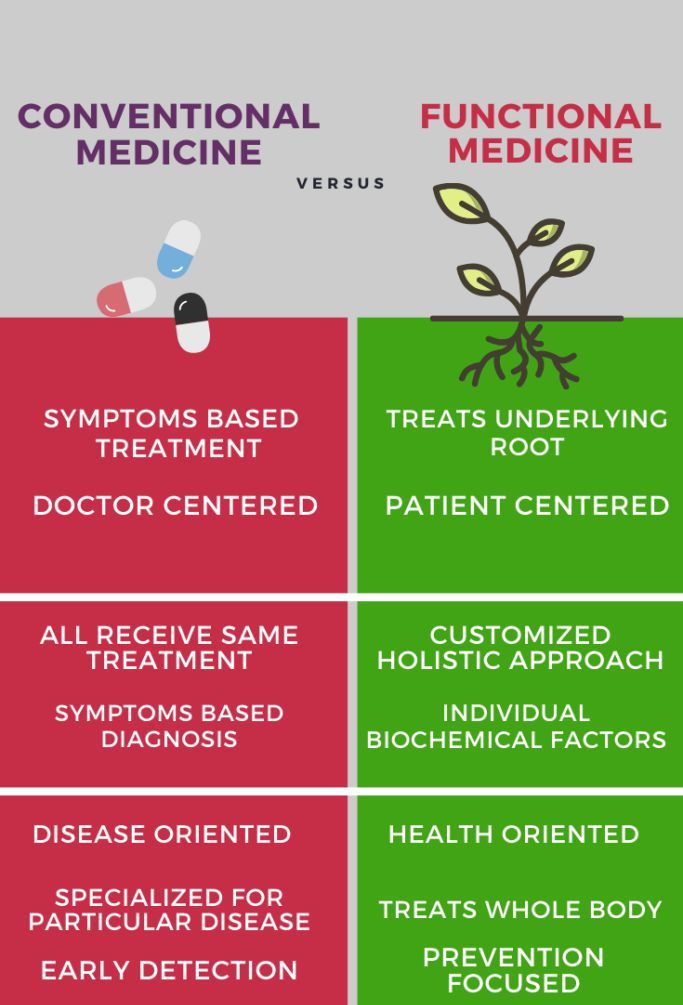Integrating Functional Medicine with Holistic Wellness Practices for Complete Health
Unveiling the Recovery Techniques of Functional Medicine and Holistic Medicine for Ideal Wellness
The exploration of functional and holistic medicine discloses distinctive yet intertwined pathways to wellness (Holistic Medicine). Functional medicine seeks to reveal the underlying reasons of ailments, while all natural medicine embraces a wider perspective of well-being that includes psychological and spiritual measurements. Together, these methods present a structure for individuals to organize their wellness journeys. This discussion will highlight the principles, practices, and distinctions between these techniques, inviting more consideration of their mixed capacity
Comprehending Functional Medicine: Principles and Practices
Functional medicine stands for a standard change in medical care, highlighting a patient-centered technique that looks for to attend to the origin and identify reason for ailment. This version integrates scientific research with medical experience, watching individuals as special individuals instead of mere signs of a condition. Specialists of useful medicine employ a systems biology point of view, discovering the communications in between genetic, ecological, and way of life factors that add to health results.
Trick principles include tailored therapy plans customized to the person's specific demands, promoting a joint partnership in between client and professional. Functional medicine also focuses on preventative care, focusing on way of life modifications, nutrition, and stress management to support general wellbeing. This strategy encourages clients to take an active role in their health and wellness, bring about improved results and a deeper understanding of their problems. Inevitably, useful medicine aims to bring back balance and promote health and wellness, transforming the medical care experience right into among empowerment and alternative recovery.

The Holistic Medicine Strategy: Incorporating Mind, Body, and Spirit
While many health care strategies concentrate only on physical signs and symptoms, alternative medicine highlights the interconnectedness of mind, body, and spirit in the quest of optimal health and wellbeing. This integrative method acknowledges that psychological and emotional factors considerably influence physical health and wellness, leading experts to consider the entire individual during therapy. Alternative medicine uses diverse methods, including nutrition, meditation, and way of living modifications, to foster balance and harmony within the person.
Experts usually involve patients in conversations about their emotions, partnerships, and life experiences, recognizing that these aspects can affect total wellness. By attending to advertising and underlying issues self-awareness, holistic medicine intends to encourage individuals in their healing journey. Holistic Medicine. This standard shift urges a proactive strategy to health, advocating for preventive actions and lifestyle modifications instead of just treating signs. Inevitably, alternative medicine looks for to grow a much deeper connection in between mind, spirit, and body, facilitating comprehensive well-being and individual development

Key Differences Between Functional and Holistic Medicine
Both alternative and functional medicine focus on comprehensive person treatment, they differ substantially in their approaches and techniques. Functional medicine emphasizes a systems-oriented technique, concentrating on identifying and treating the underlying root causes of diseases. Experts often use advanced diagnostic screening and personalized treatment strategies, which might include lifestyle supplements, drugs, and changes to bring back balance within the body's systems.
In contrast, holistic medicine takes on a broader point of view, considering the emotional, spiritual, and ecological variables influencing a client's wellness. It looks for to promote general wellbeing with a combination of alternative therapies, such as acupuncture, yoga exercise, and meditation, along with standard therapies.

Usual Conditions Dealt With by Functional and Holistic Medicine
Numerous individuals seek both functional and holistic medicine for a range of typical health problems. These techniques are often used to resolve persistent illnesses such as diabetes, high blood pressure, and autoimmune disorders (Learn More). Functional medicine concentrates on identifying underlying reasons with complete assessments, while holistic medicine highlights the interconnectedness of the mind, spirit, and body
Psychological health concerns, including stress and anxiety and anxiety, are additionally frequently dealt with within these structures, as they take into consideration emotional and psychological aspects along with physical signs and symptoms. In addition, digestive system conditions like irritable digestive tract syndrome (IBS) and food sensitivities prevail concerns, with both practices advocating for dietary adjustments and lifestyle adjustments.
People might also turn to these methods for conditions such as fatigue syndrome and fibromyalgia, where traditional therapies may drop short. By integrating different recovery techniques, holistic and useful medicine purpose to foster overall well-being and enhance quality of life for those impacted.
Just how to Choose the Right Technique for Your Wellness Journey
How does one figure out one of the most ideal health method among the myriad of options readily over here available? The choice between practical and alternative medicine calls for careful consideration of specific demands and choices. At first, one should examine their health and wellness objectives, whether they look for symptom relief or a much deeper understanding of underlying concerns. Next off, assessing one's case history and present problems can supply clarity on which strategy may be most helpful.
Examination with health care professionals experienced in both areas can supply important insights. Understanding the principles of each strategy-- useful medicine's concentrate on organic systems and all natural medicine's focus on the entire person-- can help in making an enlightened selection. Furthermore, thinking about individual values and comfort with treatment modalities, such as dietary changes or alternative treatments, is vital. Eventually, a customized method that lines up with one's lifestyle and ideas will certainly cultivate a more effective health journey.
Often Asked Inquiries
Are Functional and Holistic Medicine Covered by Insurance Coverage Strategies?
Insurance policy protection for holistic and functional medicine varies considerably by plan and service provider - Learn More. Some insurance coverage business may provide partial compensation, while others do not cover these alternate techniques whatsoever, needing out-of-pocket settlements from clients
How Much Time Does Therapy Usually Take in These Techniques?
Treatment period in functional and alternative medicine differs extensively, frequently varying from a few weeks to several months. Variables influencing this consist of specific health conditions, treatment strategies, and the individual's commitment to way of life modifications.
Can I Combine Functional and Holistic Medicine With Conventional Therapies?
Yes, people can combine practical and all natural medicine with standard treatments. This integrative method might boost overall health, however speaking with doctor is necessary to assure safety and security and effectiveness in managing therapy strategies.
What Certifications Should Professionals of These Techniques Have?
Practitioners of functional and alternative medicine must possess appropriate levels in medicine or health and wellness sciences, alongside specialized training in their particular areas - Learn More. Accreditations from identified companies boost trustworthiness and guarantee adherence to established criteria of care
Exist Particular Diets Recommended in Holistic or functional Medicine?

In useful and holistic medicine, details diets often include entire foods, plant-based alternatives, and elimination diet regimens customized to specific demands. Focus lies on nutrient thickness and preventing processed foods to enhance total wellness and health and wellbeing.
Functional medicine seeks to uncover the underlying causes of disorders, while all natural medicine embraces a wider viewpoint of wellness that includes spiritual and psychological measurements. While practical medicine is much more clinically oriented, stressing organic procedures, holistic medicine emphasizes the interconnectedness of numerous life elements. Lots of clients look for both alternative and useful medicine for a selection of common health problems. Recognizing the principles of each technique-- useful medicine's emphasis on organic systems and holistic medicine's focus on the whole person-- can aid in making an informed choice. Experts of all natural and functional medicine should possess relevant degrees in medicine or health sciences, along with specialized training in their particular areas.